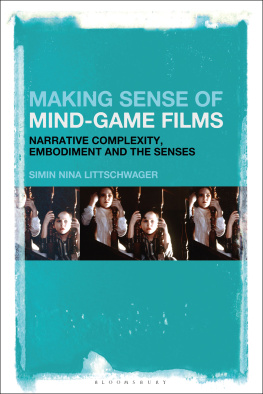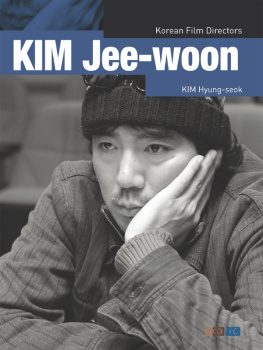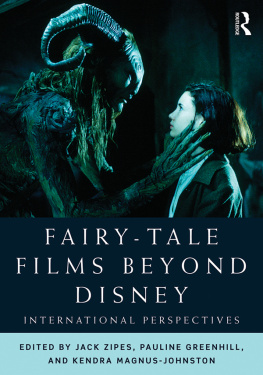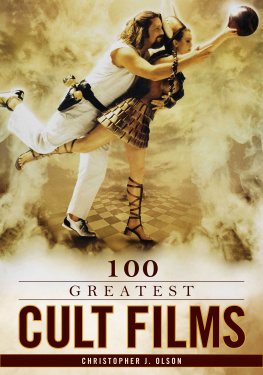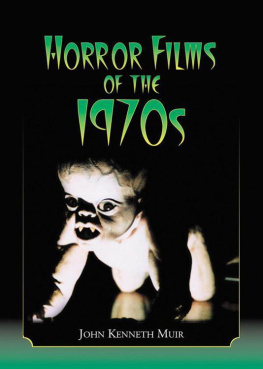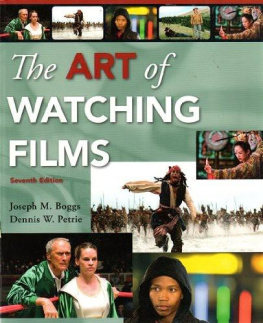Making Sense of Mind-Game Films
For Uschi & Wolfgang
Sometimes I feel a shape in the air, and I know youve been there.
Making Sense of Mind-Game Films
Narrative Complexity, Embodiment, and the Senses
Simin Nina Littschwager

Contents
Writing this book has involved many of hours of solitude, yet I am fortunate that I have never been alone with this project; this is the place to acknowledge those whose support made it possible. Special thanks go to Allan Cameron and Martine Beugnet, for their kind advice and crucial encouragement to turn this research project into a book. Thanks also to Liz Watkins, who has provided me with an invaluable introduction to Merleau-Ponty and phenomenology that continues to inspire me until today. My gratitude further extends to Katie Gallof and Erin Duffy from Bloomsbury, for their enthusiasm in taking this project onboard, and for their patience in seeing it through to completion. My thanks also go to Philipp Schmerheim, for his thoughtful comments on an earlier draft of the manuscript. Special appreciation is owed to my family, especially Lena Littschwager, who in an admirable fashion has been taking care of things in my absenceIm so lucky to have you. Elfriede and Gnter Littschwager have helped with an endless supply of parcels filled with chocolate to keep my spirits up and woolen socks to keep my feet warm. Dusty and Pancho, my two faithful feline lap assistants, also deserve an honorable mention, for making sure I keep that inner purr. But most of all I would like to thank my partner, Antony Kitchener, for his relentless support throughout the years, and for reminding me that watching and enjoying films always comes before any film theory. The award for outstanding awesomeness goes to no one else but him.
Maurice Merleau-Ponty, in his essay The Film and the New Psychology, famously asserts that the movies are peculiarly suited to make manifest the union of mind and body, mind and world, and the expression of one in the other (: 58). Yet this union of mind and body, mind and world Merleau-Ponty speaks of is not always immune to disturbance and interruption: sometimes mind, body, and world can be at odds with each other. In this book I argue that this is the case in mind-game films, in terms of both the stories they tell and the spectatorial experience they engender. In each of the case studies of this book The Sixth Sense (1999), The Others (2000), Memento (2000), Fight Club (1999), Possible Worlds (2000), and Source Code (2011)either body, mind, or world presents a problematic dimension of experience, one that also concerns us as spectators. In order to explore how, specifically, embodied structures of meaning shape and inform our understanding of these films, I draw on existential phenomenology and theories of embodied spectatorship as a theoretical framework, thus challenging the dominant view that mind-game films primarily engage our cognitive skills. Starting from the premise that watching a film always constitutes an embodied activity, and that therefore embodiment needs to be taken into account, I am interested in the following questions: What is the role and significance of the body in the mind-game film? How can we make sense of films that do not always make sense in a familiar way?
Both mind-game films and theories of embodied spectatorship have been key areas of interest in film scholarship over the past two decades. Mind-game film is a term used by Thomas Elsaesser () that all contribute to the bigger picture of understanding these complex narratives.
In addition, many complex films have been incorporated into other studies on contemporary cinema, such as national cinema and identity (). These studies concur with my assertion that mind-game films articulate ideas about perception and experience, and about embodied ways of knowing and being-in-the-world.
Besides experimenting with narrative structures that diverge from classical modes of storytelling, mind-game films have in common that they play tricks on, or mislead their audiences. Predominantly these games and deceptive maneuvers have been regarded as cognitive challenges: Complex narrative puzzles to be solved with the mind might be an apt tagline to summarize how these films have been approached. Exemplary in this regard is Mikls Kiss and Steven Willemsens book Impossible Puzzle Films (2016), a comprehensive study of the cognitive-psychological impact (: 15455, 16566). This is noteworthy not in itself but in the context of their entire book, which, as the subtitle An Introduction Through the Senses indicates, provides re-readings of major film theories based on how each considers different sensory faculties in the context of cinema. They thus acknowledge the bodily and sensory dimension of the film experience (as well the recent attention that it has received). Other chapters are devoted to, for instance, Cinema as Eye, Cinema as Ear, or Cinema as Touch. Yet mind-game films it seems are predominantly considered as brain-teasers, defined through eliciting modes of engagement in which the body and the senses play only a marginal role.
Such emphasis on the spectators cognitive activities stands in contrast to the widespread influence of phenomenology and theories of embodied spectatorship that have been a dominant trend in film theory during the past two decades. Inspired by Vivian Sobchacks seminal books The Address of the Eye (1992) and Carnal Thoughts (2004), as well as by Laura Markss The Skin of the Film (2000), there now exists a substantial amount of research that addresses cinemas sensuous and affective dimension. Of particular importance for this project is Jennifer Barkers book The Tactile Eye (2009b). In this book Barker expands on Sobchacks concept of the films body to discuss the tactile, kinetic, and visceral ways in which all filmsfrom narrative to avant-garde, from the early cinema of attractions to animation and CGI, from Hollywood to world cinemaengage and involve their spectators as corporeal viewers, each in a specific way. Other recent studies of cinema that draw on phenomenological concepts and sensuous aesthetics have explored more specifically French national cinema (). The diversity of these studies testifies to the versatility of embodied approaches to cinema and spectatorship, and there is no reason to exclude mind-game films from a phenomenological approach. Quite to the contrary, expanding the application of film phenomenology to this group of films, I reaffirm not only that this approach continues to be relevant but also that it can create new opportunities for thinking about films we thought we had already thoroughly analyzed, unraveled, and understood.
But by bringing together mind-game films and phenomenology, I do not aim at putting theories of embodied spectatorship to the test. Instead, through exploring the experiential, sensory, and affective dimension of a select number of complex narrative films, I seek to reveal how their appeal lies not only in the reordering of non-linear plots and finding solutions to narrative puzzles. The case studies discussed in this book deal with themes that are phenomenologically significant: not realizing ones own death ( The Sixth Sense , The Others ); experiencing the world with amnesia ( Memento ) or multiple personality disorder ( Fight Club ); existing as a brain in a vat ( Possible Worlds ), or being a disembodied consciousness sent into the past in another persons body ( Source Code ). These are stories about ruptures between body, mind, and world. Engaging us as embodied spectators with these stories, mind-game films are not only intellectually challenging but also experientially intriguing. They bring into conflict different regimes of knowledge and modes of experience and draw their specific appeal from eliciting conflicts between what we see and what we sense, between what we know and what we feel, and between cognitive puzzlement and bodily experience.

